
🧱Co-organisation of the Symposium 🧮L'arbitrage international en renfort de l'Obligation de Compliance (International Arbitration in support of the Compliance Obligation)
ComplianceTech® pour lire cette présentation en français ↗️ cliquer sur le drapeau français

🌐follow Marie-Anne Frison-Roche on LinkedIn
🌐subscribe to the Newsletter MAFR Regulation, Compliance, Law
____
► Full Reference: L. Aynès, M.-A. Frison-Roche, J.-B. Racine and E. Silva-Romero (dir.), L'arbitrage international en renfort de l'obligation de Compliance (International Arbitration in support of the Compliance Obligation), Journal of Regulation & Compliance (JoRC) and Institute of World Business Law of the ICC (Institute), Conseil Économique Social et Environnemental (CESE), Paris, February 9, 2024
____
____
🏗️This symposium takes place in the cycle of symposiums organised by the Journal of Regulation & Compliance (JoRC) and its partners Universities, focusing in 2023-2024 on the general theme of the Compliance Obligation
____
📚The works will then be inserted in the books:
📕L'obligation de Compliance, to be published in the 📚Régulations & Compliance Serie, co-published by the Journal of Regulation & Compliance (JoRC) and Dalloz, published in French.
📘Compliance Obligation, to be published on the 📚Compliance & Regulation Serie, co-published by the Journal of Regulation & Compliance (JoRC) and Dalloz, published in English.
____
► General presentation of the symposium: "Compliance Obligation" appears to be far from International Arbitration if Compliance Law is only understood in terms of binding regulations or even Criminal Law. Arbitration would only have contact with Compliance Obligation in a repulsive way, when a person claims to have enforced a contract before an arbitration court that disregards a compliance prohibition, e.g. corruption or money laundering. It is therefore from a negative angle that the cross-over has taken place.
The fact that Arbitration Law respects the requisite of Criminal Law is nothing new. Moreover, the power of Compliance in its detection and prevention tools, particularly in terms of evidence, no doubt increases the global efficiency.
But Compliance Obligation is based on Monumental Goals, notably linked to global human rights and active ambitions about environment and climate which, particularly in the value chain economy, take the legal form of compliance clauses, or even compliance contracts, or various commitments and plans, which the parties can ask the international arbitrator to enforce. They will do so even more as arbitrators are often the only international, or even global, judges available.
The use they will do of Contract Law, Quasi-Contract Law, Enforcement Law, Tort Law, reinforces Compliance Law in a global dimension.
____
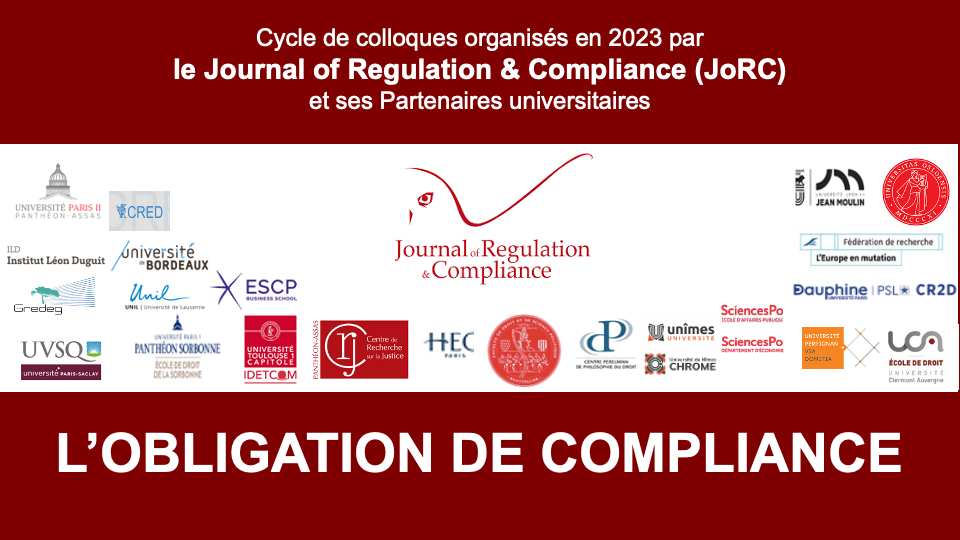
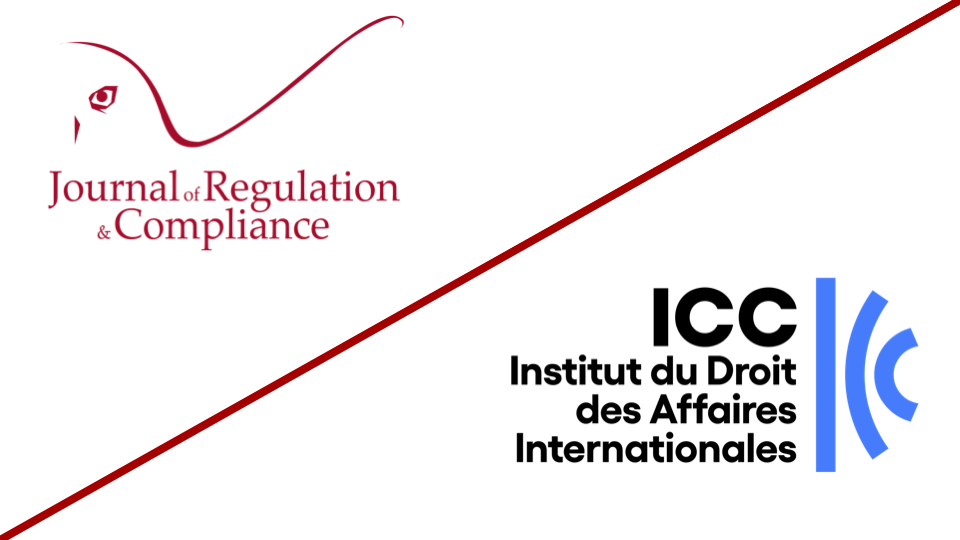
____
► Interviennent :
🎤 Laurent Aynès, emeritus Professor at Paris 1 Panthéon-Sorbonne University, Attorney, Darrois Villey Maillot Brochier (Paris)
🎤 Marie-Anne Frison-Roche, Professor of Regulatory and Compliance Law, Director of the Journal of Regulation & Compliance (JoRC)
🎤 Jean-François Guillemin, former General Secretary of the Bouygues Group
🎤 Christophe Lapp, Attorney, Advant Altana (Paris)
🎤 Jean-Baptiste Racine, Full Professor at Paris Panthéon-Assas University (Paris 2)
🎤 Eduardo Silva-Romero, President of the Institute of World Business Law of the ICC (Institute), Attorney, Wordstone (Paris)
____
🧮Read a detailed presentation of the event below⤵️
L'arbitrage international en renfort
de l'obligation de Compliance
(International Arbitration
in support of the Compliance Obligation)
under the scientific direction of
Laurent Aynès, Marie-Anne Frison-Roche, Jean-Baptiste Racine and Eduardo Silva-Romero
Friday February 9, 2024, Paris
Conseil Économique Social et Environnemental (CESE)
9 Place d'Iéna, 75016 Paris
9h-19h15. Accueil (Welcoming)
9h15-9h30. Ouverture des travaux (Opening), by Eduardo Silva-Romero, President of the Institute of World Business Law of the ICC (Institute), Attorney, Wordstone (Paris)
9h30-9h45. Préalable : ce qu’est l’obligation de Compliance (Prerequisite: the Compliance Obligation), by Marie-Anne Frison-Roche, Professor of Regulatory and Compliance Law, Director of the Journal of Regulation & Compliance (JoRC)
- I have first dealt with the very definition of the Compliance Obligation.
- After showing that the relationship between Compliance Law and International Arbitration will naturally develop, because the companies subject to it are international, because they contractualise their legal Compliance obligations and because Compliance is being jurisdictionalised📎
!footnote-3367 , the arbitrator being the natural judge since he is a global judge and the judge of the contract, I pointed out that Compliance Law does not simply entrust arbitration with the task of preventing evils, such as corruption pacts, but that it creates positive obligations for companies: to detect and prevent behaviour whose systemic effect is deleterious.
This culture of compliance is achieved either through compliance contracts📎!footnote-3365 (which outsource the handling of audits, alerts, the drawing up of plans, etc.), or through compliance clauses📎!footnote-3365 , which are inserted into distribution or supply contracts, etc.; arbitration clauses are linked to these. Thus, the alliance between Compliance and Contract is an indirect mode of alliance between Arbitration and Compliance Obligation. - The obligation of Compliance which then takes concrete form consists for the company not in making effective Ex Ante all the regulations which apply to it (conception of conformity which is at once unreasonable, blind and impossible), but in making its best efforts, which it must make visible (see Compliance Evidence System📎
!footnote-3368 ) to achieve Monumental Goals.
These Monumental Goals are systemic. The aim is to protect systems from collapse (Negative Monumental Goals) or to make them better (Positive Monumental Goals)📎!footnote-3369 . By making companies accountable, via this Ex Ante Law whose object is the future, the systemic evils of corruption, money laundering, discrimination, climate change and hatred are combated, thus finding substantial unity. The Positive Monumental Goals aim to engender sustainability, security, respect for human beings, etc. in systems, be they banking, financial, digital, climatic, etc. - The role of the Judge, and therefore also that of the Arbitrator, is renewed.
🌐consult the report of this speech made by Marie-Anne Frison-Roche on LinkedIn, which links to a general presentation of the event, which in turn links to the reports of each speech (in French)
🔲consult the slides that support this speech, 🌐also published on LinkedIn (in French)
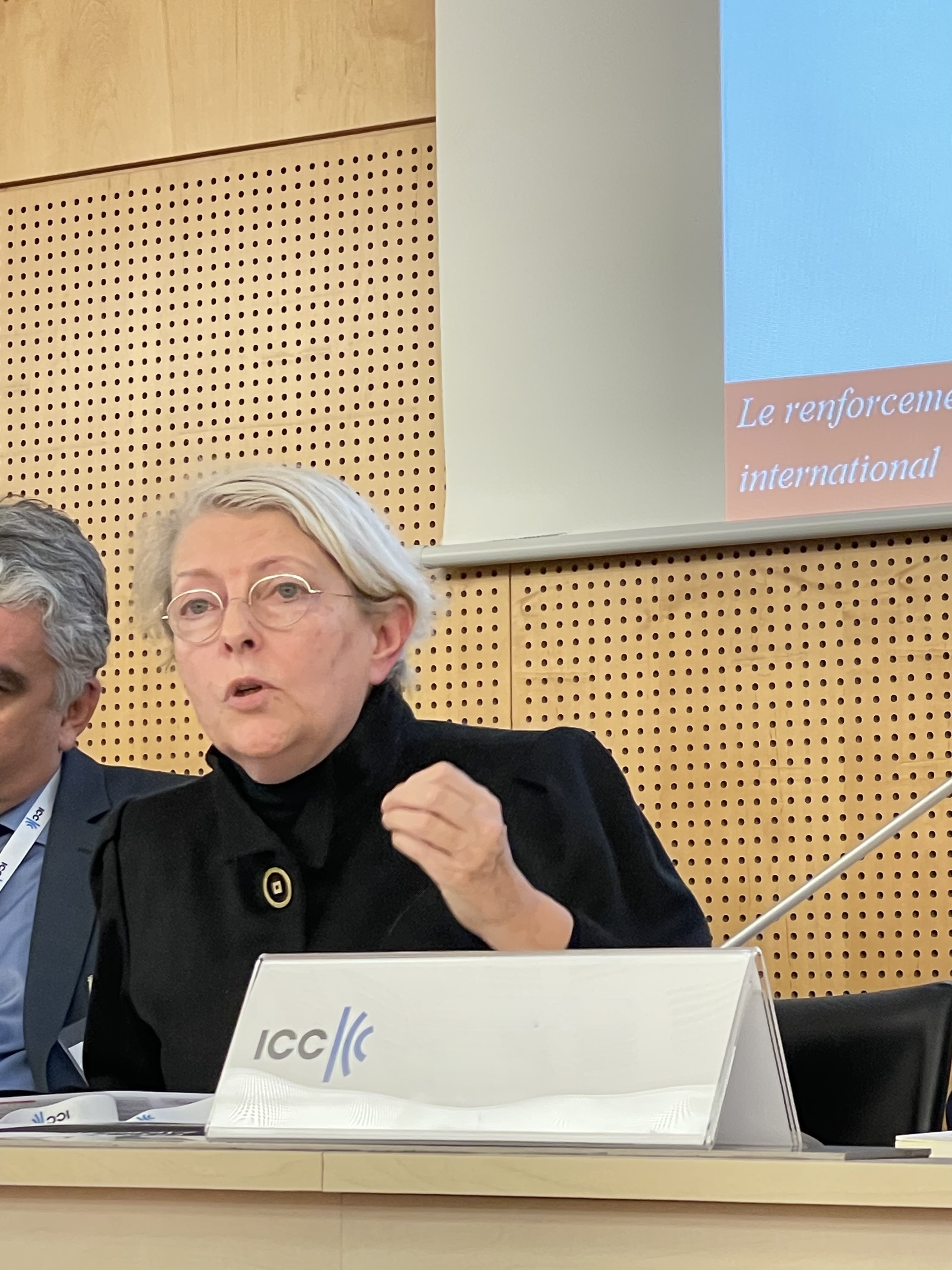
9h45-10h15. Préalable : ce qu'est un engagement (Prerequisite: the Commitment), by Marie-Anne Frison-Roche, Professor of Regulatory and Compliance Law, Director of the Journal of Regulation & Compliance (JoRC)
- Having defined the Compliance Obligation, I set out to define what a commitment is.
- No one doubts that commitments, as words, constitute facts that can engage the liability of companies if there are inconsistencies or lies. The question today is whether a commitment can constitute a legal act, binding in ex ante.
- Companies make commitments either to fulfil their legal Compliance obligations, which is simply obeying the law, or to express their own wishes, either for themselves or for others. The cases are often confused, even though the scope is not the same.
- If the commitment takes the form of a contract, Compliance is concerned if the contract is used as an Ex Ante Compliance Tool📎
!footnote-3370 , either if the entire contract has this purpose, or if a compliance clause is inserted, and an arbitration clause may be linked to it. - The commitment, a concept that comes more from the Economics of Regulation, was conceived between a Regulatory Authority and a Company: it is the unilateral decision of the Authority that gives legal force to the commitment. Case law confirms this (Conseil d'Etat (French Council of State)📎
!footnote-3371 and Conseil constitutionnel (French Constitutional Council)📎!footnote-3372 ) and this is particularly clear in Competition Law, but it is also true of the convention judiciaire d'intérêt public - CJIP (French Judicial Public Interest Agreement). - If commitment is central to Compliance, particularly Vigilance, it is because Compliance Law is an extension of Regulatory Law📎
!footnote-3373 . The company is forcibly instituted by the Compliance regulator, particularly in value chains, or on digital spaces (DSA). - In drawing up a plan, the company is fulfilling its legal obligation. But if we were to consider that it is a commitment, then we would also have to consider that the plan is the result of its will, that it must consult the stakeholders in its preparation, but that the source of the plan is its will: the provisions are not stipulations, are not applications of the law, but unilateral voluntary provisions.
In this respect, and because its source is the will of the company (which does not prevent its co-construction), a plan could contain a "graduated offer" of arbitration.
This offer could be included in commitments that are less regulated by law, such as those made in the context of CSR.
🌐consult the report of this speech made by Marie-Anne Frison-Roche on LinkedIn, which links to a general presentation of the event, which in turn links to the reports of each speech (in French)
🔲consult the slides that support this speech, 🌐also published on LinkedIn (in French)
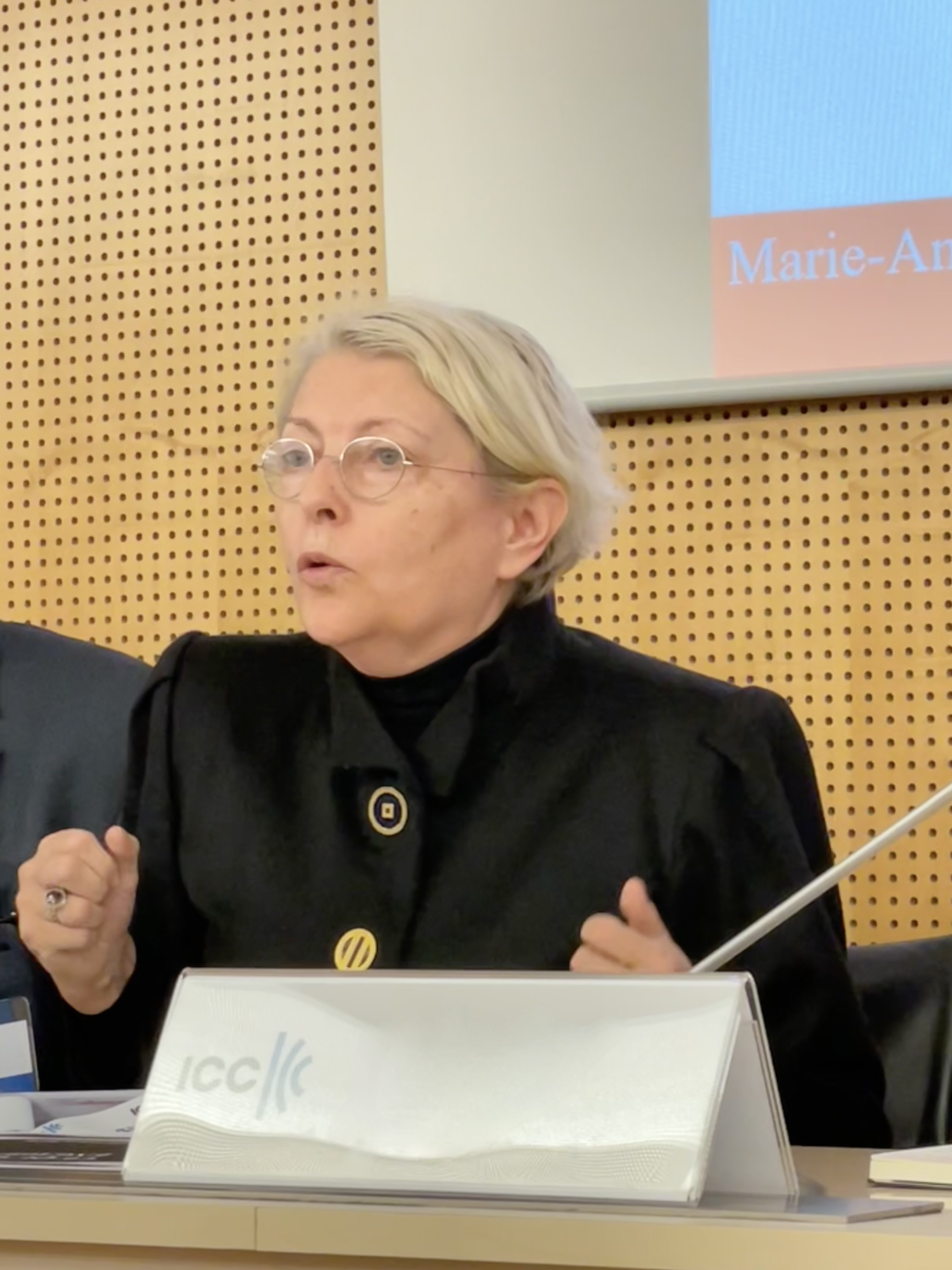
It was initially planned that I would speak on the subject Le renforcement des engagements de Compliance par le renvoi Ex Ante à l'arbitrage international (Reinforcing Compliance commitments through the Ex Ante referral to International Arbitration), but it was agreed with the other organisers of the symposium that after defining the concept of the Compliance Obligation I would refocus my second speech, mentioned above, on what a Commitment is, an essential prerequisite for dealing with the subject of International Arbitration in support of the Compliance Obligation. Developments on Reinforcing Compliance commitments through the Ex Ante referral to International Arbitration will appear in the forthcoming books: L'obligation de Compliance (in French), Compliance Obligation (in English). Nevertheless, if I had dealt with this subject, I would have raised the following points:
- The inclusion of an offer of arbitration in the field of Compliance implies considering it in a contract as well as in a non-contractual commitment, and studying which category of Compliance Obligation the offer may apply to.
- This insertion benefits from taking the form of a "graduated offer", in a crescendo organised by the company ex ante and offered to the stakeholders: conciliation, mediation and arbitration, in "circles of trust"📎
!footnote-3364 . This is supported by the current French amicable settlement policy. - The result was that I had to prepare a long "preliminary" discussion of what a "commitment" is, without which it seemed difficult to talk in concrete terms about the effective insertion of an offer of arbitration if we did not know whether such links or words had a constraining effect on the person issuing them in relation to the person benefiting from them. After discussions with the other speakers, it became clear that it would be more effective to give a talk devoted solely to the question of the legal definition of commitment. We therefore decided to allocate this second speaking slot to the notion of commitment. Since the written words do not have the same constraints, it will take up the initial construction, insisting on the different supports, either compliance contracts, or associations with compliance clauses, relating to different Compliance obligations, in particular on information or audit or Vigilance📎
!footnote-3365 , because the company must have the legal power corresponding to the mission that the State entrusts to it through Compliance📎!footnote-3366 . - The offer must be carefully drafted to explain its purpose, and its organisation must prove the reality of this purpose: to give access to a judge to people affected by the company's activity, and not to block it.
- This will therefore be available in detail in the forthcoming books:
- M.-A. Frison-Roche (ed.), 📕L'obligation de Compliance
- M.-A. Frison-Roche (ed.), 📘Compliance Obligation
🌐consult the report on these points made by Marie-Anne Frison-Roche on LinkedIn, which links to a general presentation of the event, which in turn links to the reports of each speech (in French)
10h15-10h45. L’exemple du secteur de la construction (The example of the Construction Industry), by Jean-François Guillemin, former General Secretary of the Bouygues Group and Christophe Lapp, Attorney, Advant Altana (Paris)
- Jean-François Guillemin and Christophe Lapp tackled the very concrete subject of the development already achieved of Compliance mechanisms, and of what could adequately respond to it, namely international arbitration, taking the example of the construction sector.
- Jean-François Guillemin pointed out that international arbitration is a widely used dispute resolution technique in the construction industry. He also emphasised that arbitration, like all other types of arbitration, is subject to Compliance regulations, and that arbitration must not be used to launder corruption or money. But he insists on the fact that Vigilance, which is a Compliance technique, notably with the adoption of CS3D, is now developing a public order at European level that will be very burdensome for the companies subject to it and very difficult to put in place, notably through the contracts that are drawn up, sometimes with hundreds of contractors, to build complex infrastructures. In particular, this text requires terminations, which will pose difficulties that will be reflected in arbitration.
- Christophe Lapp takes up the subject again, pointing out that in this profound Compliance movement, arbitration can be inserted through contracts, which will lead arbitrators to integrate considerations linked to the Monumental Goals of Compliance, such as climate change and human rights, forcing them to review the very concept of litigation.
- What is more, arbitration can and will be part of extra-contractual commitments. He wonders whether such commitments might not have a regulatory dimension, thereby giving rise to objective disputes. This would be all the more conceivable given that, to take the example of the French so-called "Vigilance" law of 2017, the State has delegated its authority, establishing the company as a sort of delegated regulator.
- Faced with this, the arbitrator must take into consideration not only what makes him or her an arbitrator, but also everything that the company does, for example in the value chain, with the speaker citing a code of ethics requiring all suppliers to be exemplary.
Arbitration, becoming more conducive to mediation, should then become more conducive to becoming a forum for the stakeholders to debate, leading to a reconsideration of the very notion of dispute.
🌐consult the report of this speech made by Marie-Anne Frison-Roche on LinkedIn, which links to a general presentation of the event, which in turn links to the reports of each speech (in French)
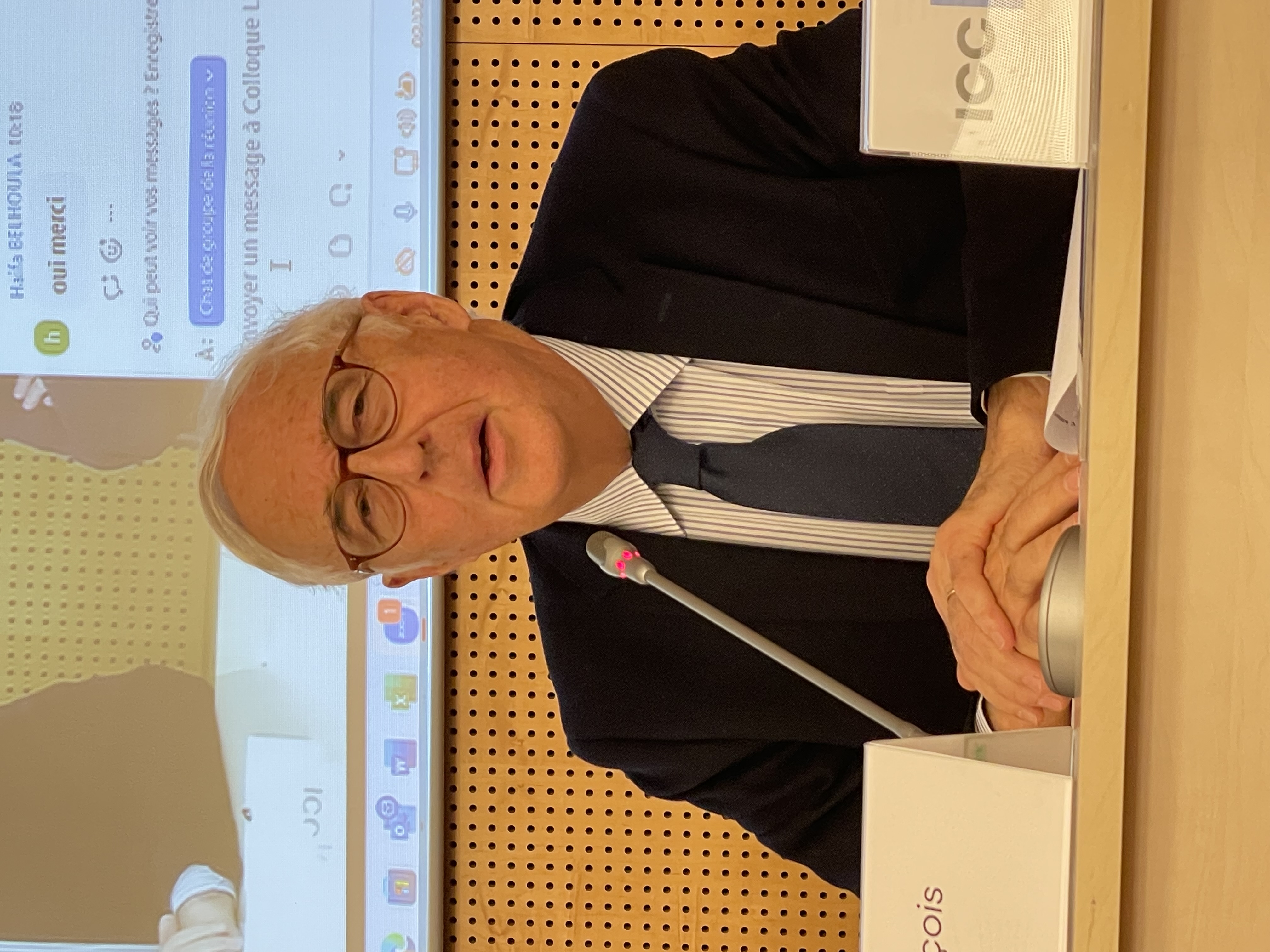
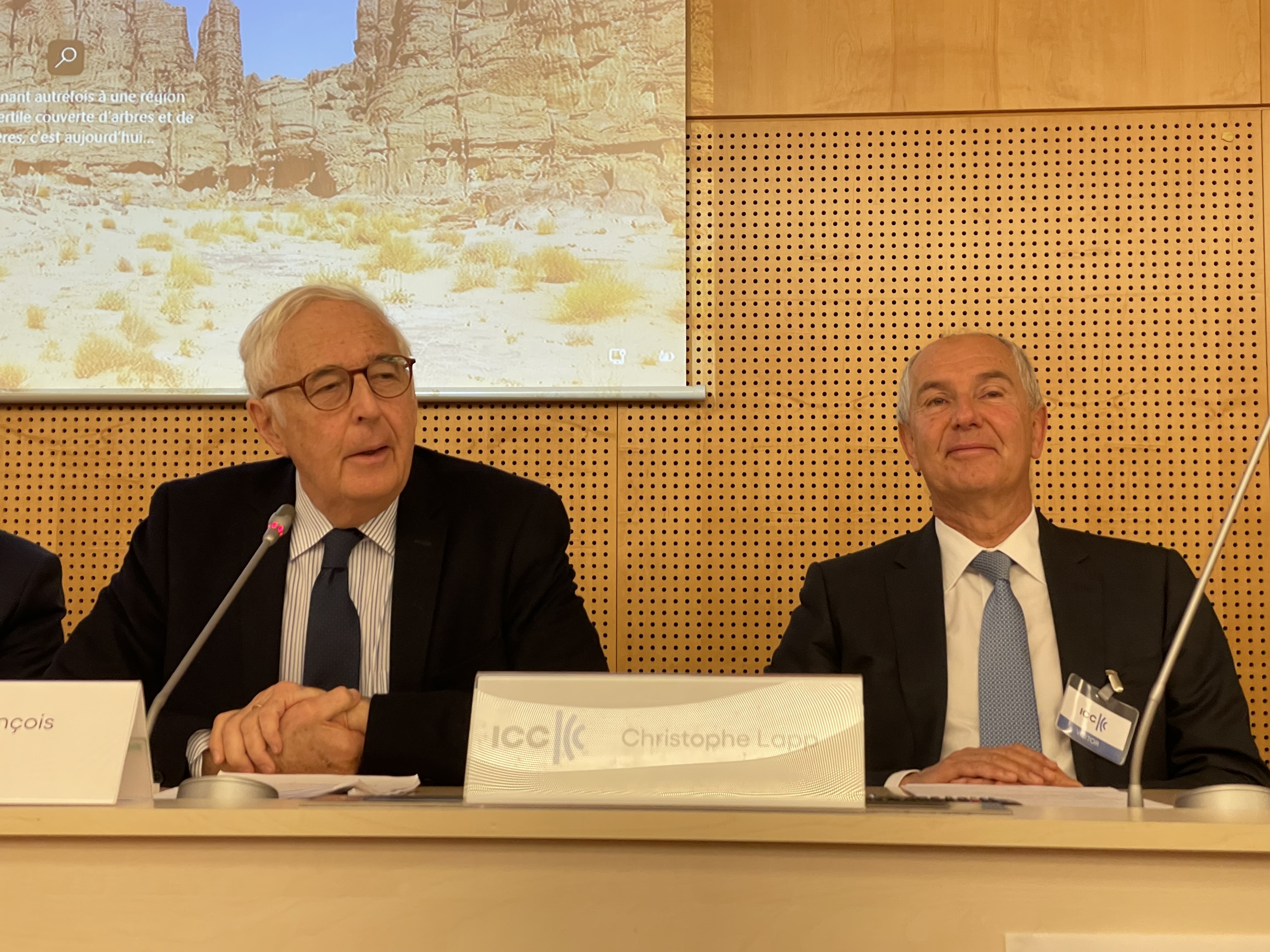
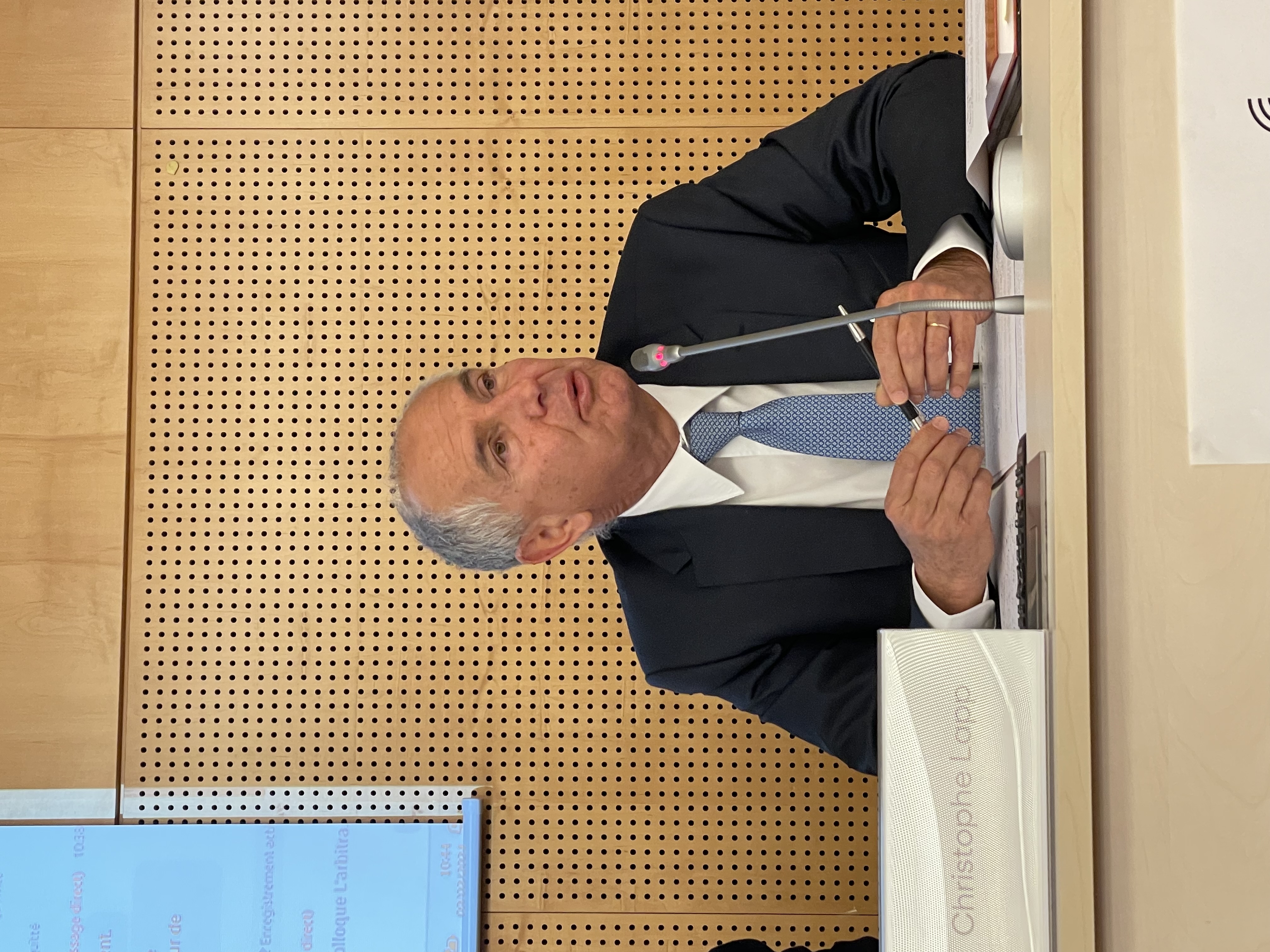
10h45-11h. Discussion (Debate)
11h-11h30. L’arbitre, juge, superviseur, accompagnateur ? (The arbitrator, Judge, Supervisor, Aide?), by Jean-Baptiste Racine, Full Professor at Paris Panthéon-Assas University (Paris 2)
- Thanks to Jean-Baptiste Racine for tackling the difficult subject of the arbitrator's office to reinforce the Compliance Obligation!
- He points out that since the role of the judge is changing in the face of Compliance litigation, because Compliance litigation will also arise in international arbitration, the role of the arbitrator must change. But the major difficulty arises from the fact that the arbitrator's powers are shaped by the will of the parties to the contract. But this can be overcome.
- As a judge, the arbitrator will assess the Compliance Obligation, for example in relation to the obligation to detect and prevent corruption or human rights abuses. Despite the exclusive jurisdiction of the Tribunal judiciaire de Paris (Paris First Instance Civil Court) in matters of Compliance, the stipulations organising Compliance can be reinforced by an arbitration clause, with the judges judging compliance with the stipulation, and it would be possible to include a provision in Compliance plans referring to arbitration.
- But the Monumental Goals of Compliance encourage us to renew the functions of the arbitrator, to make him more than a judge, going beyond the purely jurisdictional office. In the same way that an arbitrator may be asked to complete or amend a contract. If we broaden the notion of a dispute, thinking in particular of commitment procedures in Competition Law, which give rise to rights for third parties who can initiate arbitration, this is conceivable. Admittedly, what some authors have described as the externalisation of commitment control, making the arbitrator an auxiliary of the public authority, gives rise to a "arbitrage régulatoire" ("regulatory arbitration") (Laurence Idot), transforming the arbitrator's role.
The role of the arbitrator then changes and, in what is Compliance, multiple third parties would be called upon to intervene (as in Compliance), like amicus curiae. The arbitrator then becomes more of an advisor on long-term projects.
Thus, in the CS3D Directive, the corrective measures that are planned and ordered by the future authority could undoubtedly take the form of arbitration in this way. - Once a case has been referred to him, the arbitrator should not only make amends for the past, but also worry about the future, which is difficult for him since he disappears once the award has been made. But he can appoint an expert to monitor the implementation of a measure and encourage the parties to agree to return to him in the event of implementation difficulties, which is similar to the dispute board technique. This technique is used in construction and could be extended to human rights, for example.
🌐consult the report of this speech made by Marie-Anne Frison-Roche on LinkedIn, which links to a general presentation of the event, which in turn links to the reports of each speech (in French)
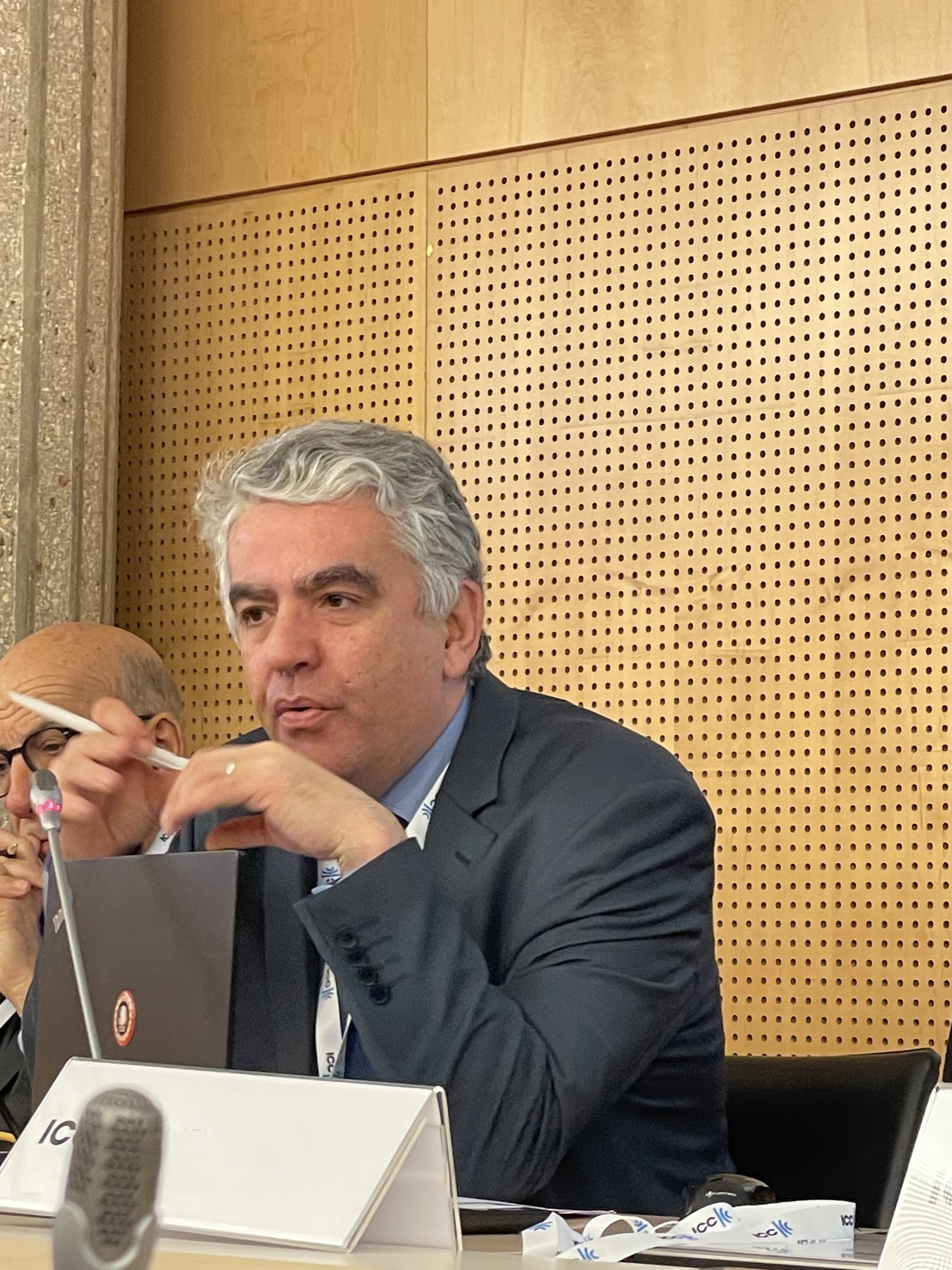
11h30-12h. La condamnation en nature par le tribunal arbitral, renfort de l'obligation de Compliance (The award in kind by the arbitral tribunal, in support of the Compliance Obligation), by Eduardo Silva-Romero, President of the Institute of World Business Law of the ICC (Institute), Attorney, Wordstone (Paris)
- Eduardo Silva-Romero developed how the arbitrator can order the performance of the Compliance Obligation, which is an obligation to do, an obligation in kind, for example to continue the works, to restore a climatic balance, to set up a remediation, etc.
- This is essential, since Compliance Law is defined by a series of active obligations, and since arbitration is traditionally more Ex Post than Ex Ante, it is resolved by an obligation to compensate and not by obligations in kind, for the performance of which the arbitrator is even more powerless than the judge.
- Eduardo Silva-Romero distinguishes between two hypotheses.
- The first is that of a provisional award, where the arbitrator is asked to order provisional and conservatory measures. In French Law, article 1468 of the Code de procédure civile (French Civil Procedure Code) gives the arbitrator the power to order periodic penalty payments, but foreign Law, such as Swiss Law, is more reticent. The question concerns the liquidation of the astreinte, which is a matter for a mixed imperium, the liquidation being more a matter for the enforcement of the award, which is a matter for the enforcement judge.
- The second issue is that of the order to perform an obligation in kind, via the astreinte mechanism, in the final award. A distinction must be made between commercial arbitration and investment arbitration.
The question still seems to be debated as regards commercial arbitration. As far as investment arbitration is concerned, this seems to be out of the question, as one award held that this would be tantamount to requiring a State not to expropriate, so the only option is to award a monetary equivalent.
The speaker did, however, raise the prospect of awarding conditional damages, the condition being a remedy, such as compensation in kind for environmental damage, but investment arbitration would undoubtedly require a change in treaties and in the thinking of arbitrators.
- It thus appears that arbitration already has a number of tools to reinforce the Compliance Obligation. But the influence of Compliance must give arbitrators more power. For this to happen, the wording of arbitration clauses will undoubtedly have to evolve, in their relationship with compliance clauses, and incorporate these powers in order to more expressly include the Monumental Goals of Compliance, unless a law is enacted to do so.
🌐consult the report of this speech made by Marie-Anne Frison-Roche on LinkedIn, which links to a general presentation of the event, which in turn links to the reports of each speech (in French)
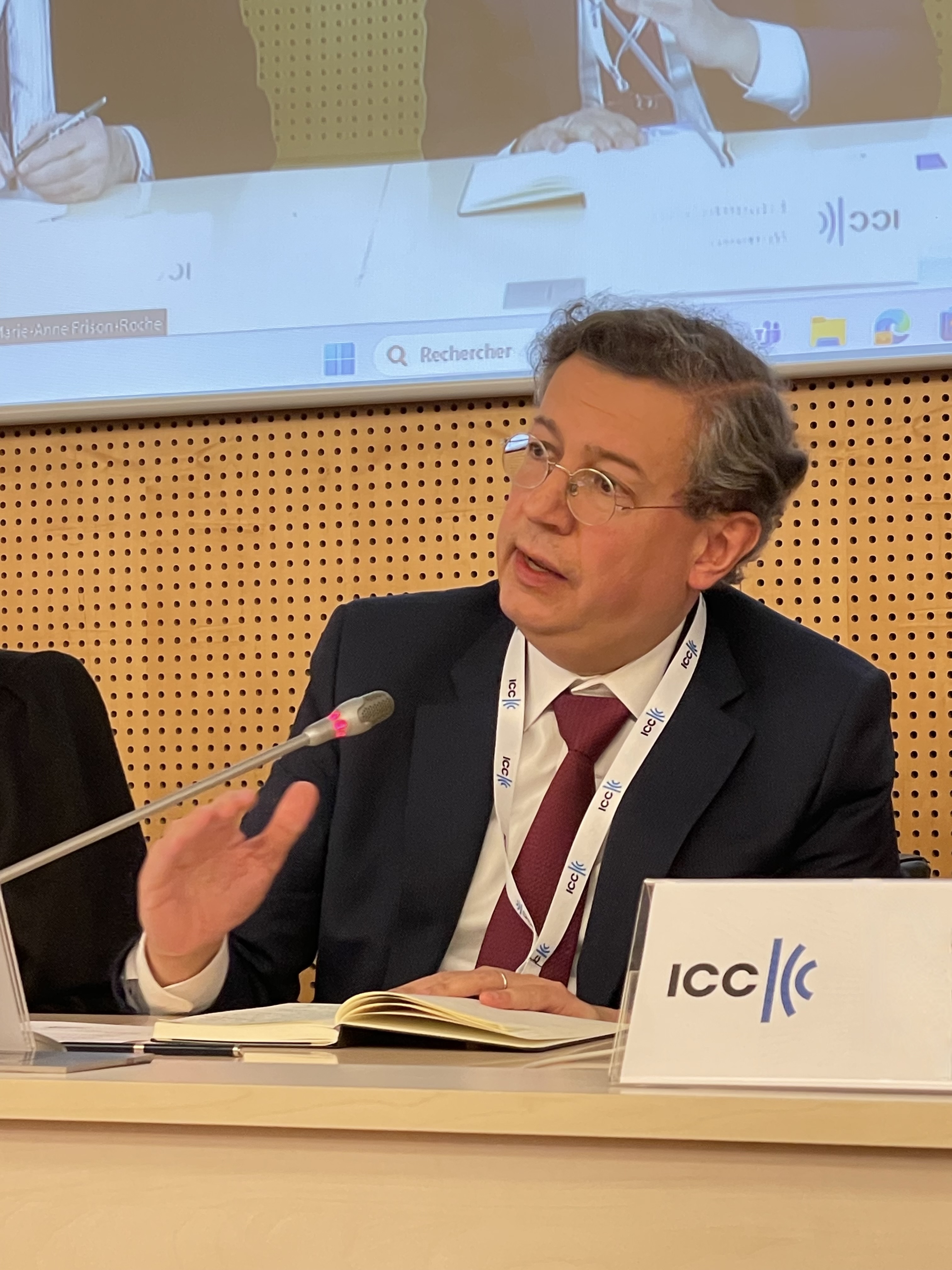
12h-12h15. Discussion (Debate)
12h15-12h45. Observations finales (Finale Observations), by Laurent Aynès, emeritus Professor at Paris 1 Panthéon-Sorbonne University, Attorney, Darrois Villey Maillot Brochier (Paris)
- Thanks to Laurent Aynès for summarising the symposium!
- He reminds us that the arbitrator intervenes on the basis of an arbitration agreement and a dispute. It is through this that the arbitrator can indirectly reinforce the Compliance Obligation and apply the Compliance standard when settling the dispute. This happens when the contract provides for both a Compliance Obligation, for example in terms of Vigilance, and an arbitration clause, and a termination occurs, or when it is a question of protecting the investor and he asks the arbitrator for the State to respect human rights as a provisional measure.
- To reach a decision, the arbitrator may refer to the Monumental Goals, which are standards that can be evoked through norms whose purpose is to prevent infringements of these goals, and even if their nature is uncertain, the arbitrator may refer to commitments. Indeed, even if their nature is uncertain, commitments are among the norms to which the arbitrator may refer.
- A party may ask the arbitrator to enforce a Compliance Obligation, which gives rise to the difficulties associated with imposing a periodic penalty payment. Apart from the periodic penalty payment, there is no reason to restrict the arbitrator to monetary measures only and he must be able to impose measures in kind.
- To go further, and make arbitration a direct Compliance body, the question is open, because it is necessary to go beyond its traditional function to make it an "auxiliaire de la Compliance" ("auxiliary of Compliance"). We need to go beyond litigation and move towards dispute resolution, in particular towards a non-contentious jurisdiction; we need to move towards a kind of natural arbitration. But if the jurisdictional route provided by arbitration clauses and agreements is more immediate, it could be considered. In any case, this can only be done with the consent that gives jurisdiction to the arbitrator. An arbitration offer could be launched by the company, an idea that should also be pursued.
- Laurent Aynès concludes that this reflects a profound transformation in the sources of Law, its role and the office of the Judge. With the gradual advent of a justice without frontiers, whose authority no longer derives from the State but from the election of the parties.
🌐consult the report of this speech made by Marie-Anne Frison-Roche on LinkedIn, which links to a general presentation of the event, which in turn links to the reports of each speech (in French)

12h45. Fin des travaux (End of the works)
________
🕴️M.-A. Frison-Roche (ed.), 📘Compliance Jurisdictionalisation, 2024.
🕴️M.-A. Frison-Roche, 📝The Judge, the Compliance Obligation and the Company. The Compliance Evidence System, in 🕴️M.-A. Frison-Roche (ed.), 📘Compliance Jurisdictionalisation, 2024.
🕴️M.-A. Frison-Roche, 📝Compliance Monumental Goals, Beating Heart of Compliance Law, in🕴️M.-A. Frison-Roche (ed.), 📘Compliance Monumental Goals, 2023.
🕴️M.-A. Frison-Roche (ed.), 📘Compliance Tools, 2021.
🕴️M.-A. Frison-Roche, 🚧From Regulation Law to Compliance Law ; 🚧Compliance Law loses the ties of Regulation Law but retains its principles: consequences for companies, 2018 ; 🚧The deployment of Regulatory Law through Compliance Law in the European project, 2023.
🕴️M.-A. Frison-Roche, 🚧Compliance and Trust, 2017.
🕴️M.-A. Frison-Roche, 🚧Conceiving Power, 2021.

comments are disabled for this article